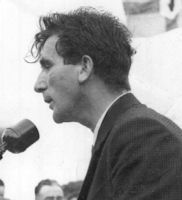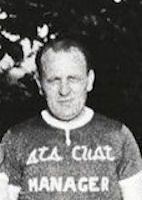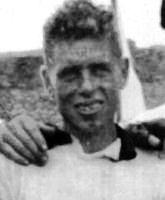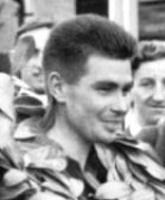 |
| Joe Christle |
Ever since Henri Desgranges founded the fabulous Tour de France away back in the early 1900’s, stage racing has caught the imagination of cyclists all over the world.
Here in Ireland the call came later than in most countries. Proximity to England caused the road sport to develop along Time Trial lines. However, even time-trialling was a poor relation branch of the sport for Track Racing was the big attraction.
The Split in 1949 swept away all the NCA roadmen leaving the NCA predominantly a track racing association with virtually no time-triallists so what road racing there was became Massed Start.
As the NCA regained strength this branch of the sport started tothrive and a road-racing calendar became established and naturally, fed on a diet of cycling reading which highlighted the Tour de France and such legendary figures as Coppi, Kubler, etc. the roadmen started to think in terms of stage racing.
The first stage was held in August 1950 when the Western CC, Belfast, put on a Belfast – Dublin – Belfast Two-Day for the Irish News Cup. (The Western had run a Belfast-Dublin one-day race since 1948).
 |
| Matt Sands, Dublin |
The following year, 1951, the British League of Racing Cyclists promoted its Tour of Britain, a 12-day race sponsored by the Daily Express and invited an NCA team to compete. The team was Karl McCarthy (winner of the Belfast-Dublin-Belfast), Con Carr, Eddie Hawkins, Matt Sands and Joe Lennon
In spite of their lack of experience in long distance massed start racing and stage racing the team did very well in the event which had stages up to 150 miles. McCarthy was placed on several stages and finished ninth overall. Lennon became the hero of the race when, after three crashes, he finished second on the final stage in London swathed in bandages.
After this, support for stage racing became greater than ever and in 1952 there were three events, a three-day Tour of Munster, a two-day Rás Laighean and the Belfast-Dublin.
At this time interest in a Tour of Ireland type of race was at its height and two men were trying to put such a race on the road. One was Joe Christle of Dublin’s Gate RC who was negotiating with the Irish Press who were interested in sponsoring such a race.
 |
| Con Carr, Kildare |
These negotiations reached an advanced stage and the 1952 Racing Calendar included a Tour of Ireland. However, just as the final contract was ready to be drawn up, a spanner was thrown into the works.
The Irish Press wanted CRE to compete in the race under terms which were completely unacceptable to the NCA and that was that.
While Joe was working in Dublin, Pat McAllister (who organized the Belfast-Dublin) was working on the problem in Belfast. He had been team manager of the Irish team in the Tour of Britain and had contacts with the Daily Express.
His aim was for the Daily Express Tour of Ireland. However, he ran into stiff opposition at home for many felt that it would be unwise for the NCA to help in publishing this newspaper in Ireland. However the Daily Express withdrew from cycle racing altogether and this probably avoided a further split in the NCA. As it was, Western CC left the Association.
 |
| Colm Christle 1st. Rás Winner 1953 |
In 1953 among the increasing number of stage races being promoted was a two-day Rás Tailteann from Dublin to Wexford. The inaugural Rás was held on the weekend of September 19/20 attracting a good field of 52 riders despite being so late in the year, only a week before the end of the road-racing season.
Mick Carr (Cork) probably had no idea when he wone the first stage, 90 miles from Dublin to Wexford, that he was leading home the first of hundreds of Rás stages
It was a good decisive win, Carr coming home on his own, 34 seconds ahead. The Carrigtwohillrider broke away from the field at Enniscorthy. He was chased home by a four-man group led in by Mick Cahill (Harps CC).
The stage back to Dublin was longer, 110 miles, and Colm Christle’s stage win gave him the overall victory, and place in the record books as the first Rás winner

